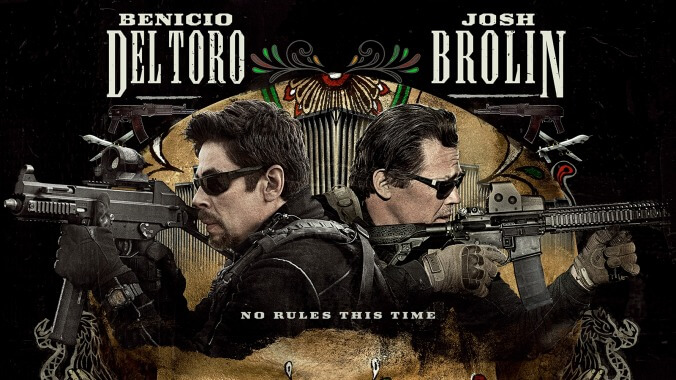Not that there’s any of that in Sicario: Day Of The Soldado, a needless sequel that serves only to deepen one’s appreciation of the original’s tightwire act and suggests that screenwriter Taylor Sheridan’s moral ambivalence about American power ended with the Obama presidency. Directed by Stefano Sollima, whose career up to now has been mostly in Italian TV, Day Of The Soldado trades the first film’s unease for scaremongering and fake grit, reimagining the shadowy Matt and Alejandro as Sam Peckinpah-esque hired guns of the modern West on one last ride south of the border—though, of course, without a Peckinpah movie’s understanding of irredeemable characters or its violent finality. (In fact, Soldado sets up a third film, presumably with the tagline, “This time, it’s personal.”) Macer, whose sidelined point of view gave the original its stomach-churning effect, is nowhere to be found.
The unpromising opening strikes a loudly sensationalist note: Terrorists are sneaking into the country through the Mexican border (cue a shot of Border Patrol agents finding prayer rugs in the desert) and blowing themselves up in grocery stores, and the cartels are to blame; we’re told their main business is no longer drugs, but smuggling people across the border. (It’s definitely still drugs, but who cares.) After taking a trip to Somalia to psychologically torture a pirate—one of the many extraneous, edgy subplots in a film that badly lacks the leanness of its predecessor—Matt is called to Washington, D.C. by the secretary of defense (Matthew Modine). It seems that the government is ready to classify the cartels as terrorist organizations, and it needs the beach-bum badman on point. He offers a plan: a false-flag operation to dupe two major syndicates into a war with each other.
To that end, he enlists his old compadre Alejandro, the lawyer turned cold-blooded killer whose family was murdered by a drug kingpin. In the stretches when Soldado hits its stride, it runs purely on plotting: an assassination on a Mexico City street in broad daylight; the kidnapping and staged “rescue” of a bratty teenage cartel heiress (Isabela Moner); a sneak attack on a convoy of rumbling Humvees that is the closest the film has to a memorable suspense set-piece. A sequence toward the end of the film detours into the bizarre, with a bloodied Alejandro stumbling through the Chihuahuan desert like a Universal monster; combined with an earlier encounter with a deaf farmer that brings to mind Frankenstein’s blind hermit, it suggests the assassin as the rejected creation of realpolitik and the war on drugs. Otherwise, the formerly intriguing Matt and Alejandro come across as stock types, tough dudes motivated by flickers of conscience and loyalty.
The occasionally hackneyed dialogue (one would hardly believe Sheridan also wrote the terrific Hell Or High Water) and anonymously copied direction comes across as a crude approximation of the original Sicario’s sinister narrative, with a similarly stripped-down mise-en-scène, but no sense of purpose. (Ironic, given the themes of the first film.) The arid landscapes, dotted with hediondillas and surveilled by drones, look familiar, but Sollima and the film’s cinematographer, Dariusz Wolski, never invest them with the ominous symbolism that Villeneuve and Roger Deakins brought to the desert. The knock-off vibe even extends to a parallel story that mimics the previous film’s corrupt-cop subplot, this time involving a teenage border smuggler (Elijah Rodriguez)—from McAllen, Texas, no less. It doesn’t do much except bog down a film that feels less like a sequel and more like a weak couple of mid-season episodes from Sicario: The Series.

 Keep scrolling for more great stories.
Keep scrolling for more great stories.
